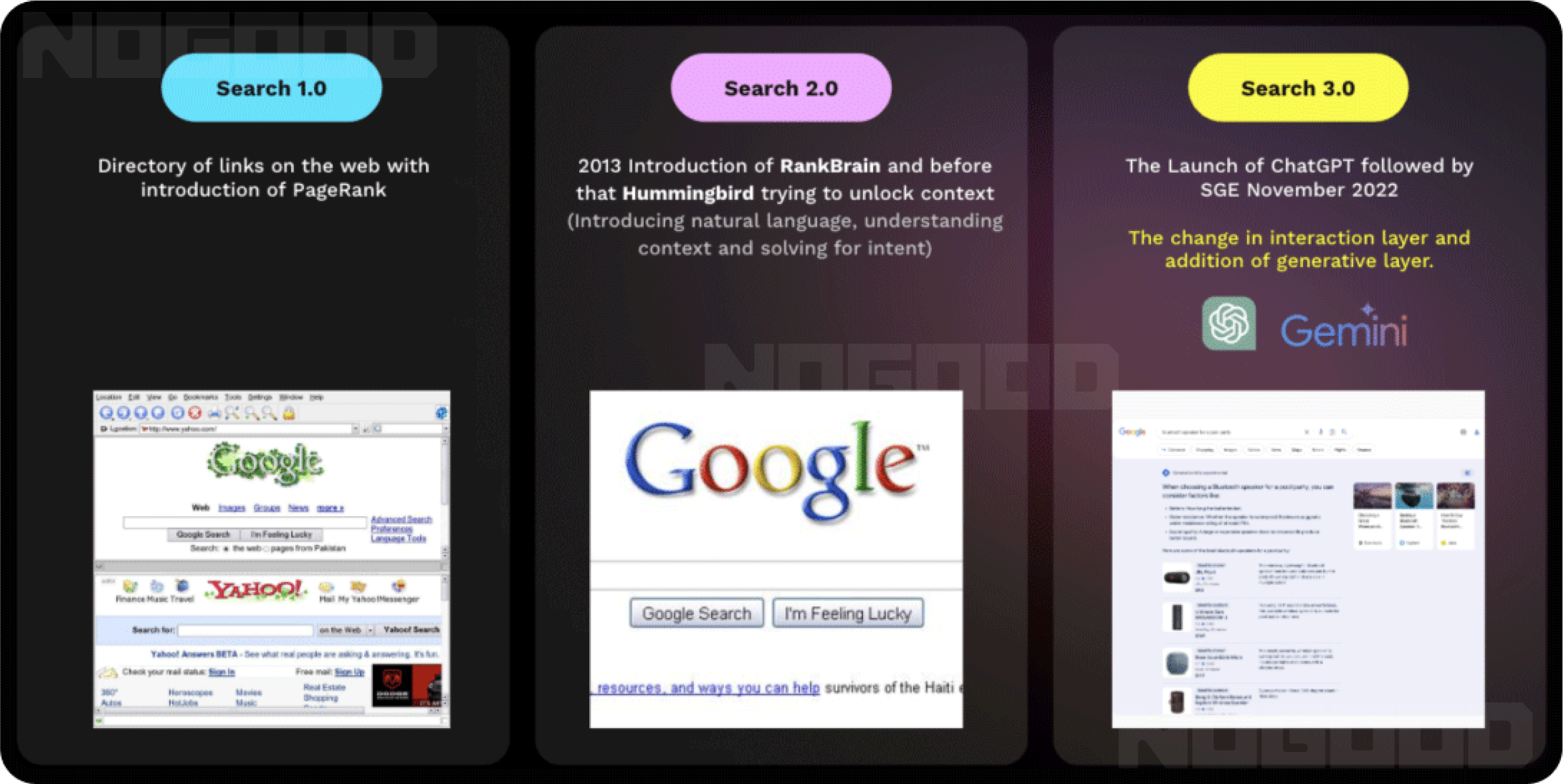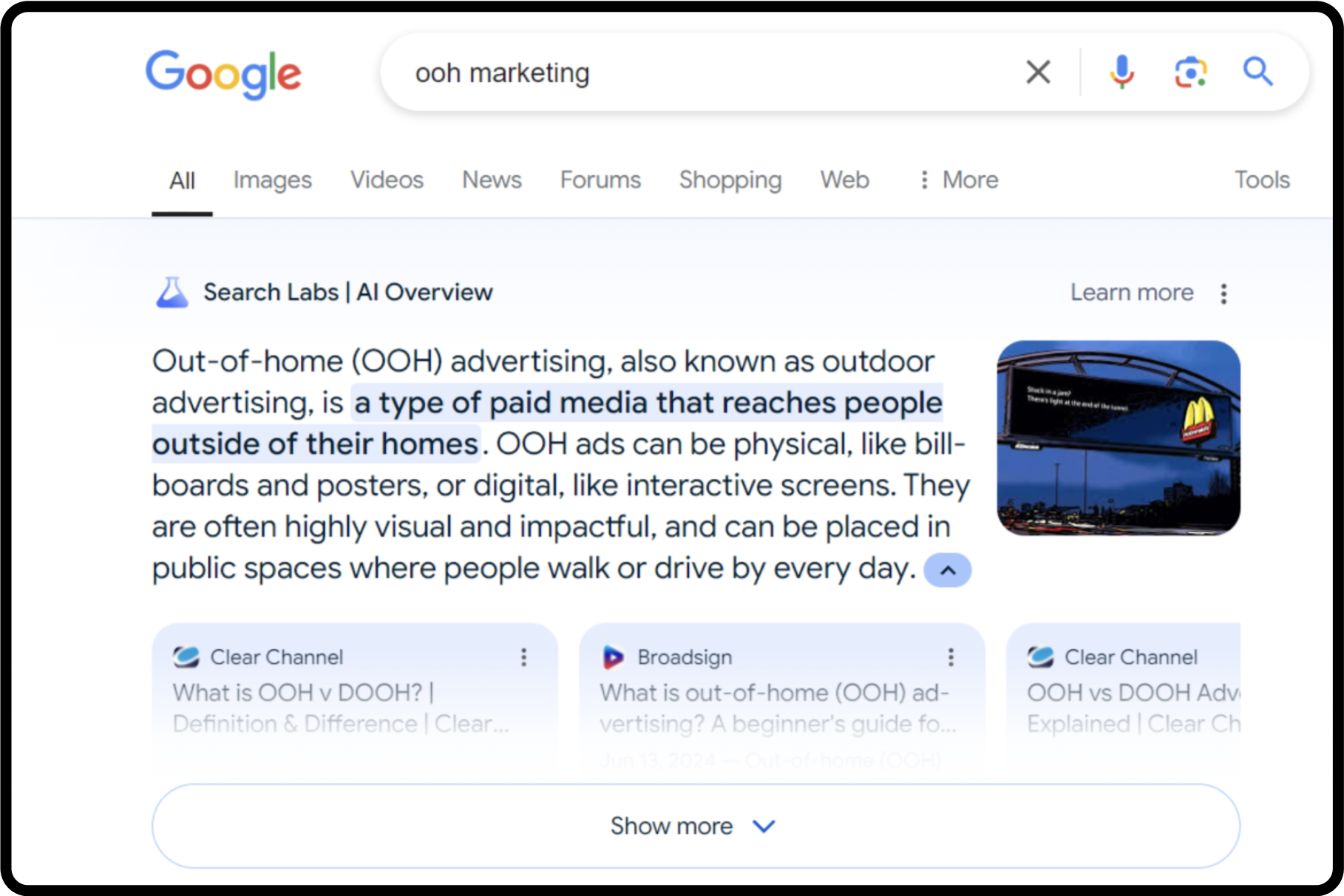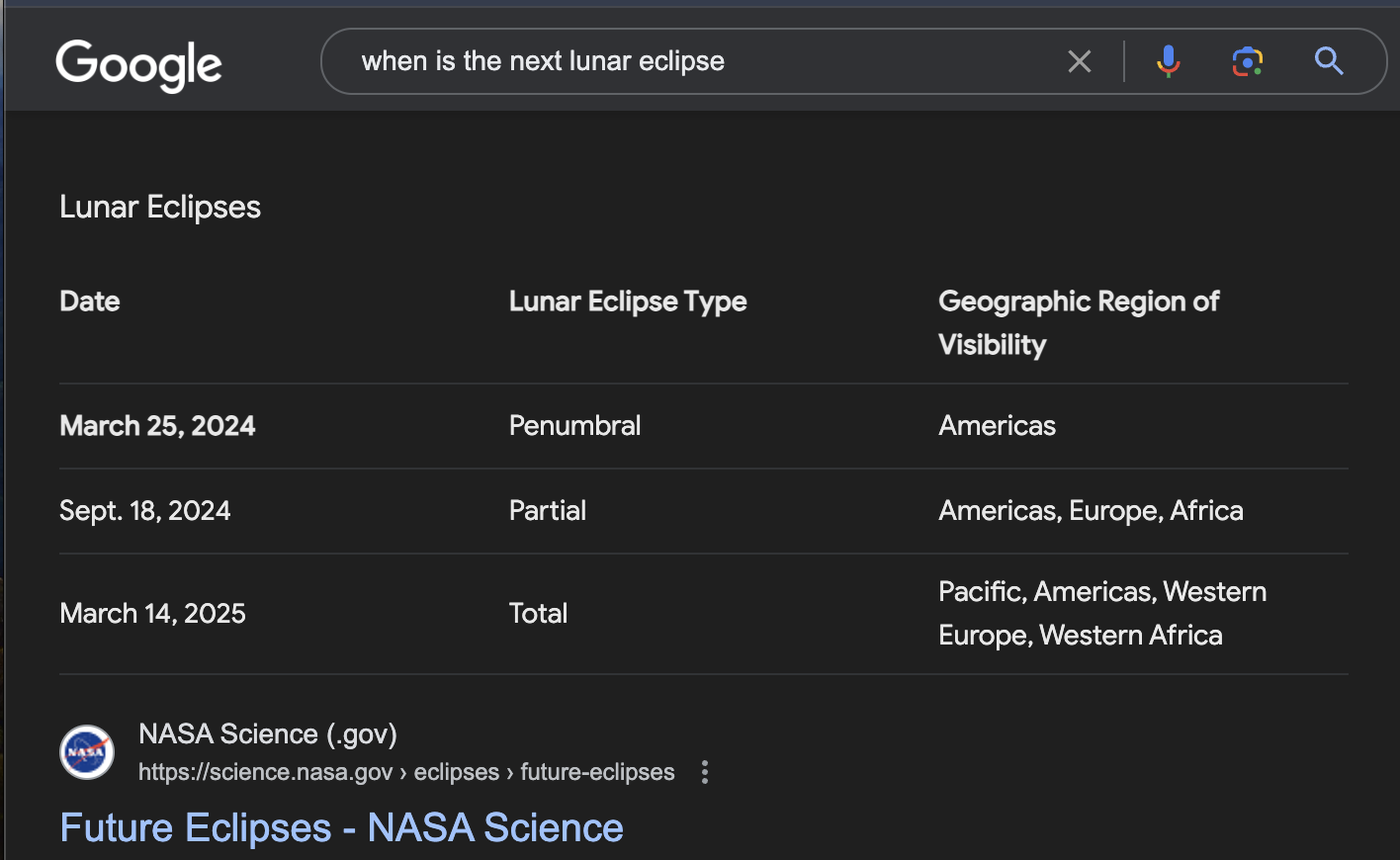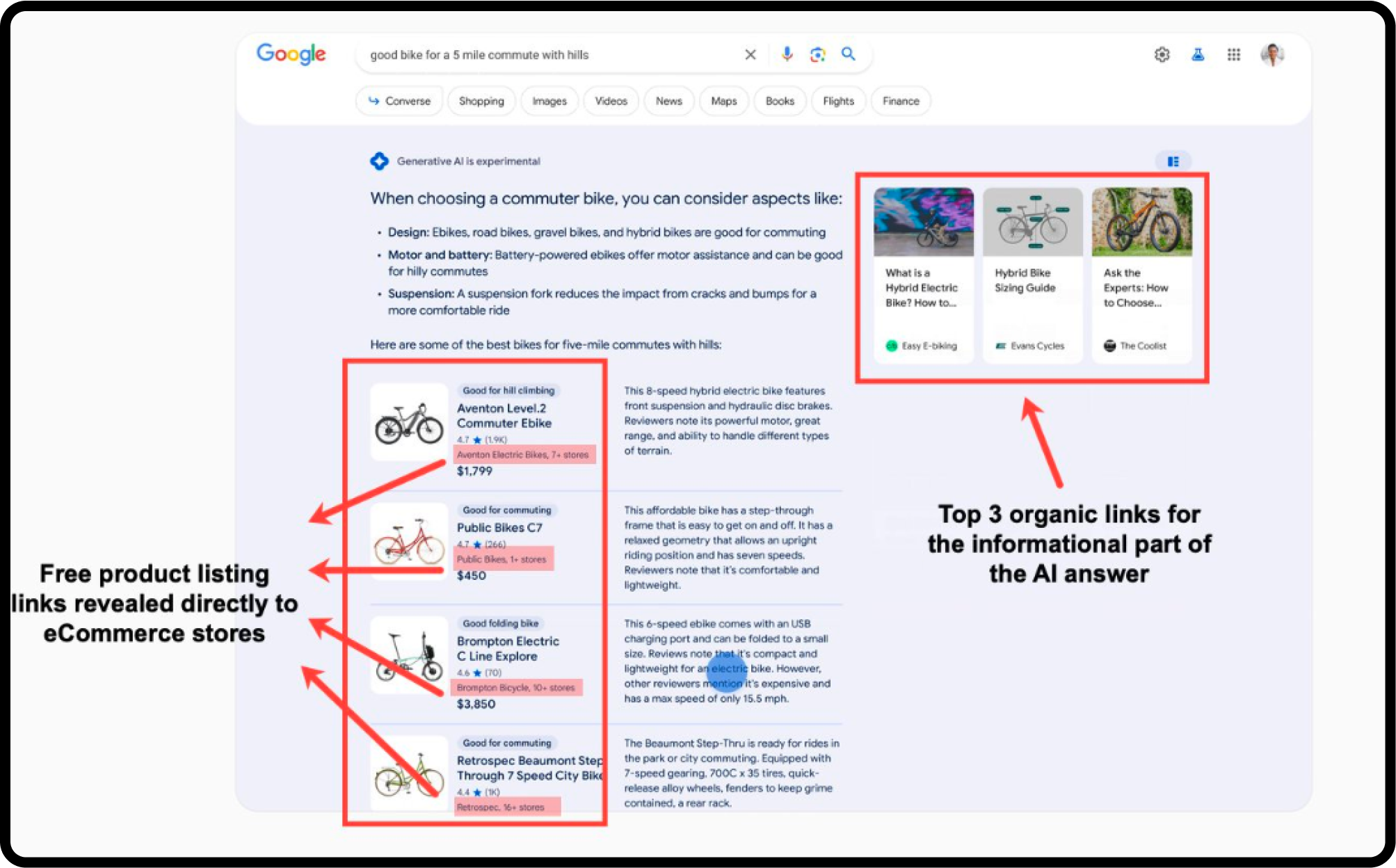Google’s advancements in artificial intelligence have forever reshaped SEO and organic traffic. Google’s integration of AI technologies into its search engine, previously Search Generative Experience (SGE), marks a shift in how users interact with search results.
As AI evolves—I mean, even Bing just launched its version of AI Overviews, its impact on SEO strategies becomes increasingly significant, requiring marketers to stay informed and adapt to maintain and grow their organic search presence.
What is Google AI Overview
Google AI encompasses a suite of machine learning and artificial intelligence technologies developed by Google to enhance various products and services. Google AI’s core is its ability to analyze and interpret vast amounts of data to improve user experiences. The technology leverages advanced models like BERT and RankBrain to better understand and process user queries, delivering more accurate and relevant search results.
Essentially, Google’s search algorithms use AI to enhance their ability to interpret and respond to user queries. RankBrain, introduced in 2015, was Google’s first AI component. It was designed to understand the intent behind search queries by analyzing previous searches and their outcomes. This helps provide relevant results even for queries that do not explicitly match the keywords. BERT, another AI model, improves the understanding of natural language by considering the context of words within a query, allowing Google to interpret complex or conversational searches better.

Understanding the Impact of Google AI Summaries on Organic Traffic
What Impact is Google AI Expected to Have on Organic Traffic?
Google’s AI-driven SGE will profoundly impact organic traffic. By providing users with AI-generated summaries directly in the search results, SGE will reduce the need for users to click through to individual websites to get the information they seek, effectively increasing zero-click searches. This shift would decrease organic traffic for many sites, as users may find sufficient answers directly within the SERPs.
The implementation of SGE can lead to significant traffic drops for certain types of content. Risk assessments indicate that websites heavily reliant on organic search traffic could experience a decline ranging from 25% to 50%. This is particularly evident for informational queries, where users typically seek quick answers.
For example, when users search for “OOH marketing,” they might receive a comprehensive AI-generated summary that negates the need to visit a specific website. Let’s take a closer look at this example.
Ahrefs just launched a new feature to help SEOs navigate the impact of Google AI Overviews. If you head to your top pages using the tool, you can now check the content changes section. According to Ahrefs, the SERP has majorly changed since publishing our article, indicating the need for us to optimize this article based on Google AI’s influence (which we’ll discuss below).

If we look at the new search results, this statement rings true.

As you can see, these AI summaries aim to offer quick and comprehensive overviews of topics, which means users might rely more on the information provided by Google without visiting multiple sources. This could particularly affect websites that rely heavily on organic search traffic for visibility and visitor engagement.
According to Aleyda Solis’s research, three main types of SGE snapshots affect ranked pages differently. The risk assessment for traffic drop varies depending on the snapshot type:
1. Direct Answer Snapshots: These provide straightforward answers to user queries. Websites that previously benefited from high traffic volumes due to such queries might see traffic drop up to 50%.
For example, while previously being able to gain traffic or impressions from featured snippets, these questions will most likely now be answered directly by Google’s AI.
2. Exploration Snapshots: These offer users multiple perspectives on a topic, potentially reducing click-through rates by 30-40% as users get diverse answers directly from the search page.
Exploration snapshots are usually relevant and authoritative while being contextually relevant to the user’s search query. For example, blog articles, tutorials, or other high-quality resources.
3. Deep Dive Snapshots: These give in-depth coverage of a topic, which might lead to a 25-35% reduction in organic traffic as the need for further clicks is minimized.
This is the type of content a user clicks on and doesn’t need to navigate to other pages afterward as they’d be satisfied. This includes research papers, expert opinions, blog articles, and more.
How Ranking Factors Have Changed with the Introduction of Google AI
The introduction of Google AI has led to a shift in how ranking factors are evaluated and prioritized. Traditional SEO practices focused on keyword optimization, backlink quality, and other on-page and off-page factors. However, with the integration of AI, there is a stronger emphasis on content relevance, context, and user intent.

As mentioned, Google AI uses advanced models that understand context and semantics better than any previous algorithms. This means that the quality and depth of content have become more critical than merely matching keywords. Additionally, AI helps Google better interpret complex and conversational queries, which changes how websites should optimize their content to meet these new standards.
One significant change driven by Google AI is the rise of zero-click experiences. These occur when users find the information they need directly in the search results without clicking through to a website. This phenomenon has increased due to AI’s ability to generate concise and comprehensive answers to queries directly within the SERPs.
As a result, businesses must adapt their SEO strategies to remain visible and valuable, where user engagement might not always translate into website visits. This shift impacts traditional success metrics, such as click-through rates, and necessitates a focus on optimizing content for direct visibility within the SERPs.
How Google AI Influences SEO Practices + Actionable Steps
1. Keyword Optimization
With the advent of SGE and other AI advancements, keyword optimization is evolving. Traditional keyword stuffing or overly simplistic keyword strategies are less effective. Instead, the focus is shifting towards creating content that naturally incorporates keywords in a meaningful context. AI algorithms prioritize content that answers user queries comprehensively and contextually rather than just matching keywords.
Actionable Steps
- I’ve seen many outlines that include specific keywords writers or content marketers need to include in specific sections. Instead of spending time adding keywords for writers, spend time researching topics related to your general query – you can use social search as a starting point. For example, look at TikTok or Quora to find out what users are interested in, which is below your umbrella term. Adding more relevant questions for the writer to focus on will help them steer clear of keyword stuffing, and I’ve found the result to be that the article sounds more human-written, natural, and in-depth.
- After reviewing the drafted article, you can now start adding keywords naturally. I know it’s hard not to focus on a “keyword content score,” but I’d say this is becoming less and less important as more top-ranking people often have lower keyword content scores.
- Don’t change the context of the writers’ draft (except if it makes sense regarding the search intent) to make a long-tail keyword fit.
2. Content Quality
Content quality has always been important, but Google AI’s ability to understand and evaluate content has raised the bar. High-quality content that is informative, well-structured, and authoritative is more likely to be featured in AI-generated summaries. Google AI favors content that provides in-depth analysis, clear answers, and trustworthy information. AKA, Investing in high-quality content creation is crucial for maintaining visibility in search results.
Actionable Steps
- The skyscraper content technique is dead (taking the top-ranking content and just improving it a little). You have to be able to give a thought leadership point of view.
- Doing more in-depth research is more important than ever before. For example, one way to ensure that your content is informative and authoritative is to get quotes from internal or external sources. While this can also help shape your article, it will differentiate it, too, while adding an extra layer of expertise. Think about it: if your agency is putting out content on a specific topic, you most likely have a bunch of internal experts to tap for this assignment.
3. User Experience
User experience (UX) is increasingly significant in SEO due to Google AI’s ability to assess how users interact with content. Factors like page load speed, mobile-friendliness, and overall site usability are critical in ranking. Google’s AI evaluates user engagement metrics like bounce rate, time on page, and interaction rates to determine the quality of the user experience. Websites that offer a seamless and engaging experience are more likely to rank higher in search results.
Actionable Steps
- Even though we’ll be covering the more technical side of SXO below, the one thing to note here is to create content that doesn’t read like generative AI created it. Above all of the technical factors, nobody wants to read an article starting with “In the ever-evolving digital marketing landscape, marketing has become essential.” Besides negatively influencing the user experience, you’re also standing a chance to be viewed by Google as a site using abusive tactics to manipulate search results, which is called scaled content abuse.
- Make use of tools to monitor the on-site performance of specific pages, such as Hotjar and Microsoft Clarity. Even though you probably have a lot of data on the performance of these, having an in-depth view of how users are reacting to your content will surely improve your content optimization skills.
4. Zero-Click Experiences
The rise of zero-click searches means more users are finding the information they need without leaving the SERPs. This trend, driven by AI’s ability to generate instant answers, requires businesses to rethink their SEO strategies. Instead of focusing solely on driving traffic to their websites, businesses need to ensure their content is visible and authoritative enough to be featured directly in the search results. This includes optimizing for featured snippets, knowledge panels, and other rich results that AI tends to populate with direct answers.
Actionable Steps
- Position yourself as an authority in the space – easier said than done, right? Once you become a recognizable and trustworthy brand that constantly pushes out helpful content (that users can’t get from an AI summary), users are more likely to click through to your site.
- Offer downloadable resources while promoting this in your meta descriptions to motivate users to click through to your site.
Need help optimizing your website AI Overviews?
How to Rank in Google AI Summaries: Best Practices
Search Engines vs. Answer Engines
Traditional search engines focus on matching keyword queries with relevant web pages, prioritizing factors like keyword density, backlinks, and meta tags. With the rise of answer engines, the focus shifts towards holistically understanding and addressing user intent.
Answer engines aim to provide direct, concise, and contextually relevant responses, often summarized from multiple sources, thus emphasizing content comprehensiveness, relevance, and user satisfaction over simple keyword optimization.
On-Page Optimization Tips for Google AI Summaries

1. Content Format & Style
High-quality content is fundamental to ranking in Google AI summaries. This involves:
- Depth and Breadth: Ensure your content covers topics comprehensively. Provide detailed explanations, examples, and insights. Google’s AI is more likely to see comprehensive content as authoritative and helpful.
- Authenticity and Engagement: Write in a way that engages readers. Use a conversational tone where appropriate, and avoid overly technical jargon unless necessary. Authentic content that resonates with readers tends to perform better.
- Visuals and Media: Incorporate images, videos, infographics, and other media to enhance content quality. Visual aids help break down complex information and improve user engagement, making your content more attractive to Google’s AI.
- Content Freshness: Ensure your data is up to date across owned assets and visuals.
2. Reverse Engineer User Intent and Create a Helpful Experience
To create content that meets the H.E.E.A.T (Helpfulness, Expertise, Authoritativeness, Trustworthiness) criteria:
- User Intent Analysis: Understand what users seek when they type specific queries. Use tools like Google Analytics, Search Console, and keyword research tools to gain insights into user behavior and preferences. During this step, it’s also important to note the format in which users prefer their content. For example, say a user is looking for influencer marketing collaboration tips. Are they expecting a lengthy blog article or a video summary?
- Helpfulness: Ensure your content directly answers users’ questions. Provide actionable insights, step-by-step guides, and practical tips that users can apply immediately.
- Expertise and Authority: Highlight your expertise by citing credible sources, including case studies, statistics, and expert opinions. Authoritative content is more likely to be featured in AI summaries.
- Trustworthiness: Build trust by ensuring your content is accurate, up-to-date, and error-free. Include author bios, references, and links to reputable sources to enhance credibility.
3. Structuring Content for Featured Snippets & Knowledge Graphs

To increase the likelihood of your content being featured in snippets and knowledge graphs:
- Clear Headings and Subheadings: Use descriptive headings and subheadings to organize your content. This helps Google understand the structure and main points of your article.
- Concise Answers: Answer common questions directly in your content. Use bullet points, numbered lists, and short paragraphs to make the information easily digestible.
- Rich Media: Embed videos, images, and diagrams to complement your text. Multimedia elements can improve your chances of appearing in rich snippets and knowledge panels.
4. Leveraging Schema Markup to Enhance Content Visibility
Implementing schema markup helps search engines better understand your content:
- Types of Schema: To categorize your content, use appropriate schema types like Article, FAQ, HowTo, and Product. This helps Google display your content in rich results formats.
- Structured Data: Ensure your schema markup is correctly implemented and validated using tools like Google’s Structured Data Testing Tool. Properly structured data can significantly enhance your content’s visibility in search results.
5. Improve Site Speed and Mobile Responsiveness
Site performance is crucial for both user experience and SEO:
- Page Speed Optimization: Optimize your website’s load times by compressing images, minifying CSS and JavaScript files, and leveraging browser caching. Fast-loading pages are favored by both users and search engines.
- Mobile-Friendliness: Use responsive design to ensure your site is mobile-friendly. Google prioritizes mobile-first indexing, making mobile optimization essential for SEO success.
6. Product Feeds
Product feeds are becoming increasingly important for Ecommerce sites in the context of Google AI. Google’s AI leverages product feeds to provide users with up-to-date product information directly within search results:
- Comprehensive and Accurate Data: Ensure your product feeds are comprehensive and regularly updated with accurate data. Include product name, price, availability, images, and descriptions. This helps Google present the most relevant and accurate information to users.
- Structured Product Data: Format your product information using structured data markup (e.g., JSON-LD). This helps Google’s AI understand and display your products more effectively.
- Optimization for Google Shopping: Optimize your product listings for Google Shopping by including high-quality images, competitive pricing, and clear product descriptions. Ensuring your product feed aligns with Google’s requirements can enhance visibility in search results.
- Integration with Merchant Center: Regularly update and manage your product feed through Google Merchant Center. This integration ensures your products are eligible for display in various Google Shopping experiences, including the SGE.
- Review Prioritization: Prioritize integrating reviews into your marketing strategy as they significantly influence product visibility in search results. Google views reviews as endorsements from satisfied customers, so emphasizing customer feedback and responsiveness will boost your product page listings.

Off-Page Optimization Tips for Google AI
1. Forced Indexing
Once a page is updated, force a re-indexation request via Google Search Console. Being up-to-date and showing consistent optimization will benefit your site when battling for the top spot in search results. Using the inspection tool, you can request Google to index your site to see newly added information or improvements to user experience.
While forcing indexing, it’s important to note that for specific keywords, like trendy ones, your content has to be kept updated with new, relevant information, as Google AI prioritizes showing the most helpful content.
2. Brand Reputation Management & Digital PR
While backlinks are still important, modern off-page SEO strategies focus more on overall brand reputation and visibility. Effective tactics include:
- Guest Posting on High-Authority Sites: Contribute high-quality content to reputable websites in your industry. This not only builds backlinks but also establishes your authority and reach.
- HARO Technique: Help a Reporter Out (HARO) is a free platform you can use to answer reporters or other writers’ questions with short answers so they can use it to quote you in their articles. This will also strengthen your brand image and help position yourself as a leader in your niche.
- Industry Awards and Recognition: Find industry awards and recognitions to boost your credibility. Highlighting these accolades on your website can improve trust and authority.
- Influencer Marketing for Brand Amplification: Collaborate with influencers to reach a broader audience. Influencer endorsements can significantly enhance your brand’s visibility and credibility.
- Affiliate Sites, Awards, & Listicles: Get featured in authoritative listicles and award sites. Being listed as a top product or service can drive traffic and improve brand perception.
- Forums & UGC Platforms (Quora, Reddit): Engage in relevant discussions on forums and user-generated content platforms. Providing valuable insights can position you as an authority in your niche.
- Positive Mentions on Authority Websites: Secure mentions and coverage from high-authority websites. These endorsements can significantly boost your SEO efforts and brand reputation.
- Product or Service Reviews from Happy Customers: Encouraging satisfied customers to leave positive reviews can improve your brand’s image and influence potential customers.
Strategies for Adapting to Algorithm Changes Driven by AI
- Monitoring Algorithm Updates and Their Impacts
Staying informed about the latest algorithm updates is essential. Check for announcements and analyses from reputable sources like Google’s own blogs regularly. Understanding the changes allows you to adjust your SEO strategies proactively and mitigate any negative impacts on your site’s rankings. - Maintaining a Focus on User Intent and Relevance
With AI-driven algorithms prioritizing user intent, creating content that addresses your audience’s needs and questions is more important than ever. Use tools like Google’s Search Console and keyword research tools to gain insights into what users are searching for and tailor your content to meet these needs. - Adjusting SEO Strategies Based on Emerging Trends
As AI continues to shape SEO, adapting to new trends is crucial. This includes optimizing for things like voice search as AI-powered voice assistants become more prevalent. Incorporate natural language keywords and phrases into your content to capture voice search traffic. - Content Diversification
Diversifying your content can help you reach a broader audience and improve engagement. Include various content types such as blogs, videos, infographics, and podcasts. This caters to different user preferences and enhances your site’s visibility in search results. Google’s AI favors rich, diverse content that provides comprehensive information. From here, you can use your own internal data to establish which type of content works best for you, as it’s often more effective than relying on external data.
By staying updated on algorithm changes, focusing on user intent, and diversifying your content, you can effectively navigate Google’s evolving search algorithm and maintain strong SEO performance.
Want to stay up to date with the latest and greatest in growth marketing?




